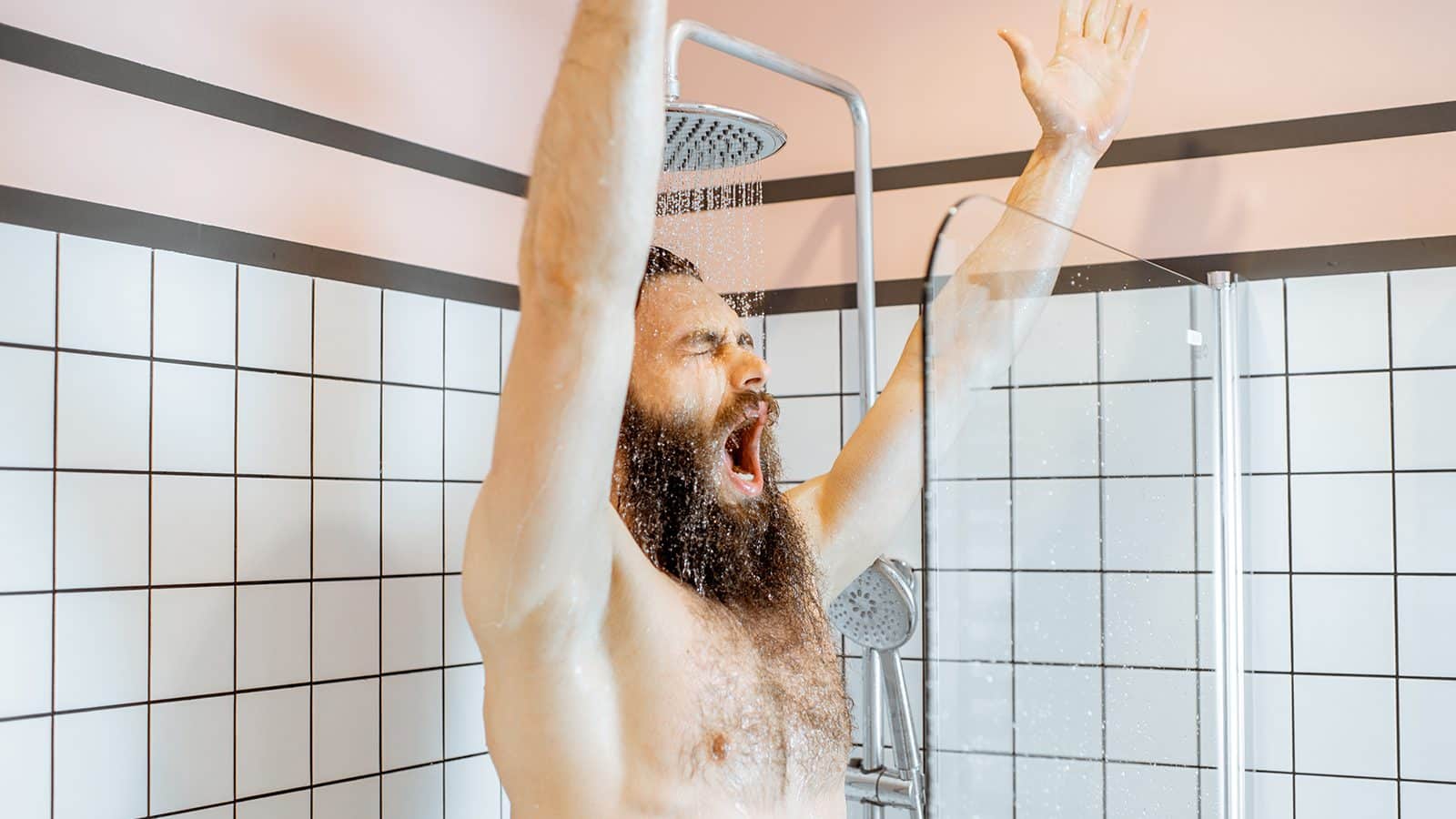Why should you take a cold shower?
Have you ever stepped into a shower expecting a warm, soothing flow, only to be greeted by an icy cascade? This cold shower experience could have unexpected health benefits. While most of us relish the comfort of a hot shower, turning down the temperature knob can offer more than just a wake-up call. According to experts at UCLA Health, embracing the chill can boost your health in several remarkable ways.
Cold showers have long been a topic of interest in health and wellness, often touted for their stimulating effects. But what does science say about this cold plunge? Drawing on insights from UCLA Health, this article explores the six key benefits of taking cold showers. The advantages of enhancing your immune system to improving your mental health are surprising and scientifically supported.
So, whether you’re a seasoned cold shower enthusiast or a skeptic considering a change, join us as we explore the refreshing world of cold showers. You might just find that a little bit of cold can do a lot of good.
Before You Start Taking a Daily Cold Shower
It’s important to approach this practice with awareness of your health condition. If you have any chronic illnesses or health concerns, it’s advisable to consult with your doctors before making cold showers a regular part of your regime. This proactive measure can ensure that the benefits you gain are safe and beneficial for your overall health.
What Are the Health Benefits of a Cold Shower?

1 – Boosting Immunity
One of the most intriguing benefits of taking a cold shower is its potential to boost your immune system. Exposure to cold water triggers physiological responses that can fortify your body’s defense mechanisms against infections. This natural enhancement of the immune system is not just folklore; scientific insights back it.
When cold water hits your skin, your body reacts like it’s under mild stress. This stress response stimulates your immune system to ramp up its activity. The immediate reaction involves an increase in the production of white blood cells. These cells, known as leukocytes, play a crucial role in your body’s defense against pathogens. Leukocytes include lymphocytes, which handle the body’s immune response, and neutrophils, which target and destroy harmful bacteria and infections.
The increase in leukocyte production directly results from the body’s attempt to warm itself up, accelerating your metabolic rate. The accelerated metabolic activity results in higher-than-normal levels of immune cells being released into the bloodstream. A Netherlands study indicated that people who regularly take cold showers see a reduction in sickness absence by up to 29%, suggesting that these showers may enhance the body’s ability to ward off illnesses.
Incorporating cold showers into your routine could be a refreshing way to boost your immunity.
2 – Easing Symptoms of Depression With a Cold Shower
Cold showers are more than just a physical refreshment; they offer a mental boost. One study found that exposure to cold water has the potential to ease depression and improve overall mental health. This benefit is linked to the physiological and biochemical responses that occur when our bodies are exposed to cold temperatures.
When you take a cold shower, your body is subjected to mild stress. This stress triggers a flood of endorphins, brain chemicals that are nature’s painkillers and mood elevators. Endorphins are often discussed as “feel-good” hormones because they produce feelings of euphoria and general well-being. This natural high can be beneficial for those suffering from depression, providing a temporary lift in mood that may help combat the pervasive sadness characteristic of the condition.
While cold showers are not a cure for depression and should not replace professional treatment options such as therapy and medication, they may serve as a complementary approach. A brief daily cold shower might be worth considering for those seeking better ways to improve their mental health regimen.
3 – Improving Circulation
Cold showers are not just for waking you up in the morning; they can also significantly improve your blood circulation. The process involves a fascinating interplay between your body’s response to cold and its need to maintain optimal internal temperatures. This natural physiological reaction can profoundly benefit your recovery times and cardiovascular health.
When exposed to cold water, the initial shock causes your blood vessels to constrict (vasoconstriction). This reaction is your body’s attempt to preserve warmth by reducing blood flow to the skin. In response, your heart works harder to push blood through these narrowed vessels, ensuring that your vital organs receive sufficient blood supply. This action helps maintain your core body temperature and strengthens your cardiovascular system by giving your heart a healthy workout.
Following this immediate vasoconstrictive response, your body undergoes vasodilation, where the blood vessels re-open once the cold stimulus is removed. This change allows blood to flow freely and rapidly, delivering oxygen and nutrients more efficiently to muscles and organs. This enhanced circulation is particularly beneficial after physical exercise as it helps to speed up the elimination of metabolic waste products, reducing recovery times and increasing muscle efficiency.
Improved circulation also brings long-term cardiovascular rewards. Regular exposure to cold water can help to reduce blood pressure and arterial stiffness, lower cholesterol levels, and improve arterial health, which are all key factors in preventing heart disease.

4 – Increase Metabolism With a Cold Shower
One of the lesser-known but equally fascinating benefits of cold showers is a possible boost in metabolism. This metabolic increase occurs as your body works to generate heat under the stress of cold exposure, which in turn can have implications for weight management.
When you take a cold shower, your body’s immediate response to the cold is to preserve core heat. To do this, it must generate more body heat, which requires energy. The process of generating this heat is known as thermogenesis. There are two key types of thermogenesis: shivering and non-shivering. Shivering thermogenesis happens when your muscles involuntarily contract to produce heat. On the other hand, non-shivering thermogenesis involves burning brown fat, which generates heat without shivering.
Cold exposure activates brown fat because it primarily converts food into body heat. Adults have small amounts of brown fat in regions like the neck and shoulders. When activated by cold, brown fat uses lipids (fats) and glucose (sugar) from the blood to generate heat, raising the body’s temperature and increasing overall metabolism. This process could increase calorie burn, which might aid weight management.
The implication for weight management is significant because an increased metabolic rate means your body uses more calories at rest. Although taking a cold shower alone won’t replace regular physical exercise or healthy dietary habits, it can complement these efforts by providing a metabolic boost that could enhance weight loss or maintenance.
Incorporating cold showers into your routine could be a simple and refreshing way to stimulate your metabolism. However, the effect on metabolism will vary based on individual factors such as body composition and overall health.
5 – Reducing Inflammation and Muscle Soreness
Cold showers can be surprisingly effective in managing inflammation and muscle soreness, particularly for athletes or those engaged in regular physical activity. This therapeutic effect is primarily due to the processes of vasoconstriction and vasodilation that occur in response to cold exposure.
Following the initial phase of vasoconstriction (explained earlier), the body undergoes vasodilation, where the blood vessels widen once the cold stimulus is removed. This sudden widening allows blood to flow more freely at a higher volume than normal. This increase in blood flow helps to flush out the metabolic waste products that accumulate in muscles during exercise. These waste products, including lactic acid, can lead to muscle soreness or inflammation. By enhancing blood flow, cold showers help rapidly reduce these waste products, thereby aiding in quicker muscle recovery and reducing soreness.
Furthermore, alternating between vasoconstriction and vasodilation helps pump out inflammation-causing agents from muscle tissues. This can be particularly beneficial after strenuous activities, as it helps to reduce muscle soreness the next day. The improved circulation reduces inflammation and promotes faster healing and recovery by supplying affected tissues with increased oxygen and nutrients.
6 – Relieving Pain
Cold showers can be an effective natural pain relief method, leveraging the body’s responses to reduce the pain sensation. This benefit is primarily linked to the effects of cold water on nerve transmission speeds and the body’s inflammatory responses. Understanding these mechanisms can help explain why a cold shower might help alleviate pain after injuries or intense physical activity.
When you expose your body to cold water, one of the immediate responses is slowing down nerve transmission. Cold temperatures can reduce the speed at which nerves transmit signals, including those signals that convey pain sensations to the brain. This slowing down can decrease the intensity of pain felt, as the brain receives fewer signals per second. This effect is similar to numbing sprays or ice packs often used in sports injuries, where the cold application temporarily relieves pain.
Again, we see vasoconstriction at work, which can help reduce swelling and inflammation at sites of injury or stress. Swelling often presses against nerves and can exacerbate pain signals. Cold showers can indirectly lessen the pain sensation by reducing swelling through vasoconstriction. Moreover, once the cold water is turned off and the body begins to warm up, vasodilation occurs, increasing blood flow to the area.
This natural pain relief method is especially beneficial for acute injuries or recovery from sports-related activities, as it provides a quick, drug-free way to manage discomfort. However, while cold showers can provide temporary relief, they do not cure underlying conditions that cause chronic pain.

Final Thoughts on the Benefits of a Cold Shower
Showering with cold water may provide some good alternatives to medications. But while the advantages of cold showers are compelling, it’s crucial to try them cautiously. Not everyone may experience the same benefits, and cold showers could pose health risks for some, especially for those with pre-existing conditions such as cardiovascular issues or extreme sensitivity to cold.


















